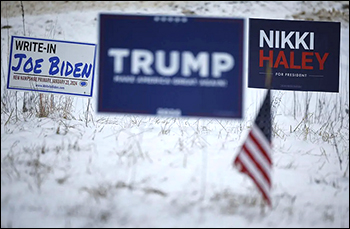By Jim Ellis — Friday, July 12, 2024
President

President Joe Biden / Photo by Gage Skidmore
To win the party nomination, a candidate must have 1,968 votes. This means from the remaining delegates, the president would need only keep 387 of the “freed” 2,368 delegates who are already pledged to vote for him. This factors into just 16.3 percent of the non-state law bound delegates.
The party would also have the option of changing the convention rules to allow the Super Delegates to vote on the first ballot, something they cannot currently do. The Super Delegates are officially called PLEO (Party Leader Elected Official) votes. There are 747 of these individuals. To add them, however, the non-PLEO delegates would have to vote to dilute their own power. It is unlikely a majority of the non-PLEO delegates will vote in such a manner even if this unlikely choice is presented.
House
New York: Biden’s Poll Deficit — The political situation continues to deteriorate for President Biden. As reported on X from journalist Jacqueline Sweet, Democratic polls that won’t be published apparently report that the president is trailing in two potential Democratic conversion districts by double-digit margins, seats that he carried in 2020.
The two are NY-17 and NY-19 that freshmen Reps. Mike Lawler (R-Pearl River) and Marc Molinaro (R-Red Hook) currently represent and won with close margins. As a point of reference, Biden carried the 17th with a 54-44 percent margin in 2020, and a 51-47 percent split in NY-19.
UT-2: Canvass Period Begins; Recount to Follow — Utah US Rep. Celeste Maloy (R-Cedar City) is not out of the woods yet from her close Republican primary race against businessman Colby Jenkins, conducted on June 25. The Utah election officials finally finished the end count, and what was a 309-vote margin for Maloy has dropped to 214 votes.
The process is not yet finished. The election staff must conduct a canvass to certify a final vote. Since the current margin is now within the range where a recount can be requested, Jenkins says he will do so after the canvass. This means the counting and recounting process could drag on until the end of July.
States
Delaware: Candidate Filing Closes — Candidate filing has now closed for the late Delaware primary scheduled for Sept. 10. Though the state features an open Senate and at-large House seat, little in the way of competition will be seen either in the Democratic primary or general election.
US Rep. Lisa Blunt Rochester (D-Wilmington) is a lock for the party nomination and the November election and will replace retiring Sen. Tom Carper (D) in the next Congress. State Sen. Sarah McBride (D-Wilmington) is the prohibitive favorite to win the party primary and the November election to replace Rep. Blunt Rochester. Upon election, she will become the first transgender individual elected to Congress.
The only competition appears to occur in the open governor’s race as incumbent John Carney (D) is ineligible to seek a third term. Lt. Gov. Bethany Hall-Long, New Castle County Executive Matt Mayer, and National Wildlife Federation CEO Collin O’Mara are all competing for the Democratic nomination. The eventual primary winner will then punch his or her ticket to the governor’s mansion.






